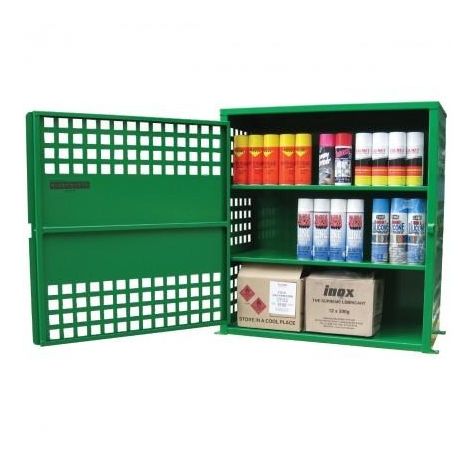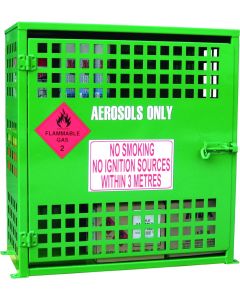Do you need an aerosol storage cage?

Aerosol cans are widely used in the construction and infrastructure sectors, particularly for delivering paints, lubricants, adhesives, degreasers and even the humble insect spray. Spray cans use a propellant such as hydrocarbon to eject the substance out under pressure and therefore, as the contents are stored under pressure, they can be an explosion hazard in the workplace.
Although they’re often thought of as a low-risk item - think of the can of deodorant in your work bag! - they are actually classed as Dangerous Goods. They should be treated with respect and stored safely on site so they do not become a safety risk.
What happens when aerosol cages explode?
When exposed to extreme heat or fire, aerosol containers are put under pressures much higher than they were designed to contain. This occurs when the substance inside expands when heated, thereby increasing the pressure. When exposed to fire, aerosol cans can either rupture violently or produce plumes of flames. Typically one can rupturing will cause those next to it to ignite, setting off further explosions.
This is one of the main risks in the workplace: the potential for fire or explosions to expand and reach other dangerous or hazardous goods, causing even more serious issues.
How should aerosol cans be stored in the workplace?
 Aerosol cans used in the workplace should be stored correctly to ensure the safety of workers.
Aerosol cans used in the workplace should be stored correctly to ensure the safety of workers.
If you have paint, spray glue, lubricants, lacquers or aerosols stored at your depot or in your store room, and they are simply stored in cupboards or on open shelving, then you may not be meeting your WHS requirements.
This is where an aerosol storage cage can be useful. These robust steel storage cages are purpose built to store aerosols safely.
What are the guidelines for storing aerosol cans on site?
Although there is a wealth of information on Dangerous Goods in general, there is only brief information and guidelines relating specifically to aerosols.
The Australian Standard AS/NZS 3833:2007 “The storage and handling of mixed classes of dangerous goods, in packages and intermediate bulk containers” offers some guidelines. These include protecting cans from the weather and direct sunlight, ensuring they are more than 1.5 metres from flammable liquids and more than 3 metres from heat and ignition sources.
However, the environment the aerosols are stored in, along with the quantity, has an effect on how they should be stored.
AS 1940:2017 “Flammable Liquids Storage & Handling” provides a recommendation that small quantities of aerosols can be stored in a flammable liquid storage cabinet. This provides both containment and fire resistance.
In most cases aerosol cans can be legally stored in an approved flammable liquid cabinet however it is best to keep them in a dedicated aerosol storage cage, because these are properly ventilated.
Ventilated cages allow for the dispersion of leaks into the atmosphere. This ensures leaking material or gas does not build up and become an ignition risk. An aerosol storage cabinet will stop cans from acting as a dangerous missile if they explode in a fire situation. However, a ventilated cabinet will provide less fire protection than a solid cabinet.
As you can see there is some grey area on aerosol storage, with no one right way that suits all businesses. The type of work environment and quantity of product stored will have a bearing on the right type of storage unit for your workplace.
The best course of action is to read the safety data sheets for the products you have on site, consult the Australian Standard and any local regulations, and talk to your WHS representative for recommendations that suit your individual workplace.
General things to consider:
- Conduct a risk assessment specific to your site
- Ensure you have the SDSs on file for all substances used and stored on site
- Store aerosols in a designated area
- Keep aerosols away from any sources of ignition or heat
- Store aerosol cans in a ventilated cabinet
- Ensure cabinets include approved safety signage and/or dangerous goods placards
- Ensure fire protection, extinguishers and systems are appropriate for the substances stored on site
- Ensure your spill containment and clean up processes are in place
- Above all, ensure your staff have adequate awareness of the risks, and provide training so that everyone on site understands the hazards and what to do in the event of an explosion
Shop for aerosol storage cages online at Jaybro
If you decide an aerosol storage cage is the right solution for your site, Jaybro can help. We supply a range of cabinets suitable for 18 cans right up to 625 cans. These storage cabinets offer economical, secure, and safe relocatable storage, and vertical and horizontal options are available to suit different space requirements.
 Sign In
Sign In 


